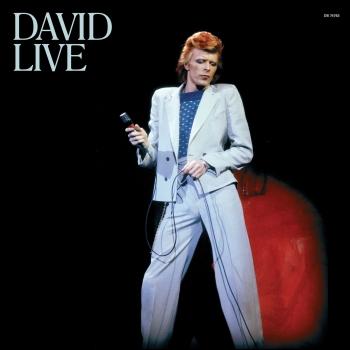
PinUps (Remastered) David Bowie
Album Info
Album Veröffentlichung:
2015
HRA-Veröffentlichung:
09.12.2015
Label: Warner Music Group
Genre: Rock
Subgenre: Classic Rock
Interpret: David Bowie
Komponist: Roger Daltrey, Jim McCarty, Keith Relf, Paul Samwell Smith, Bob Feldman, G Goldstein, Richard Gottehrer, J Dee, Bill Farley, Jimmy Duncan, Bert Berns, George Young, Harry Vanda, Billy Arnold, Pete Townshend, Crouch, James Beck Jim Gordon, Karlson, Konrad, Stavely, Syd Ba
Das Album enthält Albumcover
Entschuldigen Sie bitte!
Sehr geehrter HIGHRESAUDIO Besucher,
leider kann das Album zurzeit aufgrund von Länder- und Lizenzbeschränkungen nicht gekauft werden oder uns liegt der offizielle Veröffentlichungstermin für Ihr Land noch nicht vor. Wir aktualisieren unsere Veröffentlichungstermine ein- bis zweimal die Woche. Bitte schauen Sie ab und zu mal wieder rein.
Wir empfehlen Ihnen das Album auf Ihre Merkliste zu setzen.
Wir bedanken uns für Ihr Verständnis und Ihre Geduld.
Ihr, HIGHRESAUDIO
- 1 Rosalyn 02:21
- 2 Here Comes The Night 03:10
- 3 I Wish You Would 02:48
- 4 See Emily Play 04:13
- 5 Everything's Alright 02:29
- 6 I Can't Explain 02:15
- 7 Friday On My Mind 02:57
- 8 Sorrow 02:53
- 9 Don't Bring Me Down 02:06
- 10 Shapes Of Things 02:54
- 11 Anyway, Anyhow, Anywhere 03:14
- 12 Where Have All The Good Times Gone 02:41
Info zu PinUps (Remastered)
„PinUps“ served as a sort of 'how to' guide to David Bowie's career. This all-covers album shed light on his ability to adopt personas and emulate musical genres with amazing speed and diversity. It also showed that Bowie was anticipating a different musical climate for the rest of the decade, signifying a change from what was admired during the 1960s.
The psychedelic overtones of Pink Floyd's 'See Emily Play' and the garage rock cynicism of the Easybeats' 'Friday On My Mind' perfectly display Bowie's ear for melody and eye for pop-culture posturing. He even tips a hat to his more established influences. The Kinks' 'Where Have All The Good Times Gone' sparks his interest as a memory-soaked ballad (a Ray Davies specialty), and with The Who's 'Anyway, Anyhow, Anywhere' Bowie admits to not having invented the rock 'n' roll ego.
„PinUps“ served another suitable purpose for the chameleonic performer, down-playing his other-worldly image by betraying his influences. By presenting Bowie as an actual fan--and not just an image/style manipulator--the album portrayed the singer in a different light, allowing him to loosen up his approach to performing and to step outside the multiple characters he had created for himself.
„PinUps“ fits into David Bowie's output roughly where Moondog Matinee (which, strangely enough, appeared the very same month) did into the Band's output, which is to say that it didn't seem to fit in at all. Just as a lot of fans of Levon Helm et al. couldn't figure where a bunch of rock & roll and R&B covers fit alongside their output of original songs, so Bowie's fans -- after enjoying a string of fiercely original LPs going back to 1970's The Man Who Sold the World -- weren't able to make too much out of Pin Ups' new recordings of a brace of '60s British hits. Ziggy Stardust and Aladdin Sane had established Bowie as perhaps the most fiercely original of all England's glam rockers (though Marc Bolan's fans would dispute that to their dying day), so an album of covers didn't make any sense and was especially confusing for American fans -- apart from the Easybeats' 'Friday on My Mind' and the Yardbirds' 'Shapes of Things,' little here was among the biggest hits of their respective artists' careers, and the Who's 'I Can't Explain' and 'Anyway Anyhow Anywhere' were the only ones whose original versions were easily available or played very often on the radio; everything else was as much a history lesson, for Pink Floyd fans whose knowledge of that band went back no further than Atom Heart Mother, or into Liverpool rock (the Merseys' 'Sorrow'), as it was a tour through Bowie's taste in '60s music. The latter was a mixed bag stylistically, opening with the Pretty Things' high-energy Bo Diddley homage 'Rosalyn' and segueing directly into a hard, surging rendition of Them's version of Bert Berns' 'Here Comes the Night,' filled with crunchy guitars; 'I Wish You Would' and 'Shapes of Things' were both showcases for Bowie's and Mick Ronson's guitars, and 'See Emily Play' emphasized the punkish (as opposed to the psychedelic) side of the song. 'Sorrow,' which benefited from a new saxophone break, was actually a distinct improvement over the original, managing to be edgier and more elegant all at once, and could easily have been a single at the time, and Bowie's slow version of 'I Can't Explain' was distinctly different from the Who's original -- in other words, Pin Ups was an artistic statement, of sorts, with some thought behind it, rather than just a quick album of oldies covers to buy some time, as it was often dismissed as being. In the broader context of Bowie's career, Pin Ups was more than an anomaly -- it marked the swan song for the Spiders from Mars and something of an interlude between the first and second phases of his international career; the next, beginning with Diamond Dogs, would be a break from his glam rock phase, going off in new directions. It's not a bad bridge between the two, and it has endured across the decades -- and the reissue remasterings since the late '90s have made it worth discovering all over again.
David Bowie, vocals, guitar, tenor and alto saxophone, harmonica, synthesizer
Mick Ronson, guitar, piano, vocals
Trevor Bolder, bass
Aynsley Dunbar, drums
Additional musicians:
Mike Garson, piano, organ, harpsichord, electric piano
Ken Fordham, baritone saxophone
G.A. MacCormack, backing vocals
Ron Wood, guitar on 'Growin' Up'
Recorded July 1973 at Château d'Hérouville, Hérouville, France
Engineered by Dennis MacKay
Produced by Ken Scott, David Bowie
Digitally remastered
David Bowie
The cliché about David Bowie says he's a musical chameleon, adapting himself according to fashion and trends. While such a criticism is too glib, there's no denying that Bowie demonstrated remarkable skill for perceiving musical trends at his peak in the '70s. After spending several years in the late '60s as a mod and as an all-around music-hall entertainer, Bowie reinvented himself as a hippie singer/songwriter. Prior to his breakthrough in 1972, he recorded a proto-metal record and a pop/rock album, eventually redefining glam rock with his ambiguously sexy Ziggy Stardust persona. Ziggy made Bowie an international star, yet he wasn't content to continue to churn out glitter rock. By the mid-'70s, he developed an effete, sophisticated version of Philly soul that he dubbed 'plastic soul,' which eventually morphed into the eerie avant-pop of 1976's Station to Station. Shortly afterward, he relocated to Berlin, where he recorded three experimental electronic albums with Brian Eno. At the dawn of the '80s, Bowie was still at the height of his powers, yet following his blockbuster dance-pop album Let's Dance in 1983, he slowly sank into mediocrity before salvaging his career in the early '90s. Even when he was out of fashion in the '80s and '90s, it was clear that Bowie was one of the most influential musicians in rock, for better and for worse. Each one of his phases in the '70s sparked a number of subgenres, including punk, new wave, goth rock, the new romantics, and electronica. Few rockers ever had such lasting impact.
David Jones began performing music when he was 13 years old, learning the saxophone while he was at Bromley Technical High School; another pivotal event happened at the school, when his left pupil became permanently dilated in a schoolyard fight. Following his graduation at 16, he worked as a commercial artist while playing saxophone in a number of mod bands, including the King Bees, the Manish Boys (which also featured Jimmy Page as a session man), and Davey Jones & the Lower Third. All three of those bands released singles, which were generally ignored, yet he continued performing, changing his name to David Bowie in 1966 after the Monkees' Davy Jones became an international star. Over the course of 1966, he released three mod singles on Pye Records, which were all ignored. The following year, he signed with Deram, releasing the music hall, Anthony Newley-styled David Bowie that year. Upon completing the record, he spent several weeks in a Scottish Buddhist monastery. Once he left the monastery, he studied with Lindsay Kemp's mime troupe, forming his own mime company, the Feathers, in 1969. The Feathers were short-lived, and he formed the experimental art group Beckenham Arts Lab in 1969.
Bowie needed to finance the Arts Lab, so he signed with Mercury Records that year and released Man of Words, Man of Music, a trippy singer/songwriter album featuring 'Space Oddity.' The song was released as a single and became a major hit in the U.K., convincing Bowie to concentrate on music. Hooking up with his old friend Marc Bolan, he began miming at some of Bolan's T. Rex concerts, eventually touring with Bolan, bassist/producer Tony Visconti, guitarist Mick Ronson, and drummer Cambridge as Hype. The band quickly fell apart, yet Bowie and Ronson remained close, working on the material that formed Bowie's next album, The Man Who Sold the World, as well as recruiting Michael 'Woody' Woodmansey as their drummer. Produced by Tony Visconti, who also played bass, The Man Who Sold the World was a heavy guitar rock album that failed to gain much attention. Bowie followed the album in late 1971 with the pop/rock Hunky Dory, an album that featured Ronson and keyboardist Rick Wakeman.
Following its release, Bowie began to develop his most famous incarnation, Ziggy Stardust: an androgynous, bisexual rock star from another planet. Before he unveiled Ziggy, Bowie claimed in a January 1972 interview with Melody Maker that he was gay, helping to stir interest in his forthcoming album. Taking cues from Bolan's stylish glam rock, Bowie dyed his hair orange and began wearing women's clothing. He began calling himself Ziggy Stardust, and his backing band -- Ronson, Woodmansey, and bassist Trevor Bolder -- were the Spiders from Mars. The Rise and Fall of Ziggy Stardust and the Spiders from Mars was released with much fanfare in England in late 1972. The album and its lavish, theatrical concerts became a sensation throughout England, and it helped him become the only glam rocker to carve out a niche in America. Ziggy Stardust became a word-of-mouth hit in the U.S., and the re-released 'Space Oddity' -- which was now also the title of the re-released Man of Words, Man of Music -- reached the American Top 20. Bowie quickly followed Ziggy with Aladdin Sane later in 1973. Not only did he record a new album that year, but he also produced Lou Reed's Transformer, the Stooges' Raw Power, and Mott the Hoople's comeback All the Young Dudes, for which he also wrote the title track.
Given the amount of work Bowie packed into 1972 and 1973, it wasn't surprising that his relentless schedule began to catch up with him. After recording the all-covers Pin-Ups with the Spiders from Mars, he unexpectedly announced the band's breakup, as well as his retirement from live performances, during the group's final show that year. He retreated from the spotlight to work on a musical adaptation of George Orwell's 1984, but once he was denied the rights to the novel, he transformed the work into Diamond Dogs. The album was released to generally poor reviews in 1974, yet it generated the hit single 'Rebel Rebel,' and he supported the album with an elaborate and expensive American tour. As the tour progressed, Bowie became fascinated with soul music, eventually redesigning the entire show to reflect his new 'plastic soul.' Hiring guitarist Carlos Alomar as the band's leader, Bowie refashioned his group into a Philly soul band and recostumed himself in sophisticated, stylish fashions. The change took fans by surprise, as did the double-album David Live, which featured material recorded on the 1974 tour.
Young Americans, released in 1975, was the culmination of Bowie's soul obsession, and it became his first major crossover hit, peaking in the American Top Ten and generating his first U.S. number one hit in 'Fame,' a song he co-wrote with John Lennon and Alomar. Bowie relocated to Los Angeles, where he earned his first movie role in Nicolas Roeg's The Man Who Fell to Earth (1976). While in L.A., he recorded Station to Station, which took the plastic soul of Young Americans into darker, avant-garde-tinged directions, yet was also a huge hit, generating the Top Ten single 'Golden Years.' The album inaugurated Bowie's persona of the elegant 'Thin White Duke,' and it reflected Bowie's growing cocaine-fueled paranoia. Soon, he decided Los Angeles was too boring and returned to England; shortly after arriving back in London, he gave the awaiting crowd a Nazi salute, a signal of his growing, drug-addled detachment from reality. The incident caused enormous controversy, and Bowie left the country to settle in Berlin, where he lived and worked with Brian Eno.
Once in Berlin, Bowie sobered up and began painting, as well as studying art. He also developed a fascination with German electronic music, which Eno helped him fulfill on their first album together, Low. Released early in 1977, Low was a startling mixture of electronics, pop, and avant-garde technique. While it was greeted with mixed reviews at the time, it proved to be one of the most influential albums of the late '70s, as did its follow-up, Heroes, which followed that year. Not only did Bowie record two solo albums in 1977, but he also helmed Iggy Pop's comeback records The Idiot and Lust for Life, and toured anonymously as Pop's keyboardist. He resumed his acting career in 1977, appearing in Just a Gigolo with Marlene Dietrich and Kim Novak, as well as narrating Eugene Ormandy's version of Peter and the Wolf. Bowie returned to the stage in 1978, launching an international tour that was captured on the double-album Stage. During 1979, Bowie and Eno recorded Lodger in New York, Switzerland, and Berlin, releasing the album at the end of the year. Lodger was supported with several innovative videos, as was 1980's Scary Monsters, and these videos -- 'DJ,' 'Fashion,' 'Ashes to Ashes' -- became staples on early MTV.
Scary Monsters was Bowie's last album for RCA, and it wrapped up his most innovative, productive period. Later in 1980, he performed the title role in stage production of The Elephant Man, including several shows on Broadway. Over the next two years, he took an extended break from recording, appearing in Christiane F (1981) and the vampire movie The Hunger (1982), returning to the studio only for his 1981 collaboration with Queen, 'Under Pressure,' and the theme for Paul Schrader's remake of Cat People. In 1983, he signed an expensive contract with EMI Records and released Let's Dance. Bowie had recruited Chic guitarist Nile Rodgers to produce the album, giving the record a sleek, funky foundation, and hired the unknown Stevie Ray Vaughan as lead guitarist. Let's Dance became his most successful record, thanks to stylish, innovative videos for 'Let's Dance' and 'China Girl,' which turned both songs into Top Ten hits. Bowie supported the record with the sold-out arena tour Serious Moonlight.
Greeted with massive success for the first time, Bowie wasn't quite sure how to react, and he eventually decided to replicate Let's Dance with 1984's Tonight. While the album sold well, producing the Top Ten hit 'Blue Jean,' it received poor reviews and was ultimately a commercial disappointment. He stalled in 1985, recording a duet of Martha & the Vandellas' 'Dancing in the Street' with Mick Jagger for Live Aid. He also spent more time jet-setting, appearing at celebrity events across the globe, and appeared in several movies -- Into the Night (1985), Absolute Beginners (1986), Labyrinth (1986) -- that turned out to be bombs. Bowie returned to recording in 1987 with the widely panned Never Let Me Down, supporting the album with the Glass Spider tour, which also received poor reviews. In 1989, he remastered his RCA catalog with Rykodisc for CD release, kicking off the series with the three-disc box Sound + Vision. Bowie supported the discs with an accompanying tour of the same name, claming that he was retiring all of his older characters from performance following the tour. Sound + Vision was successful, and Ziggy Stardust re-charted amidst the hoopla.
Sound + Vision may have been a success, but Bowie's next project was perhaps his most unsuccessful. Picking up on the abrasive, dissonant rock of Sonic Youth and the Pixies, Bowie formed his own guitar rock combo, Tin Machine, with guitarist Reeves Gabrels, bassist Hunt Sales, and his drummer brother Tony, who had previously worked on Iggy Pop's Lust for Life with Bowie. Tin Machine released an eponymous album to poor reviews that summer and supported it with a club tour, which was only moderately successful. Despite the poor reviews, Tin Machine released a second album, the appropriately titled Tin Machine II, in 1991, and it was completely ignored.
Bowie returned to a solo career in 1993 with the sophisticated, soulful Black Tie White Noise, recording the album with Nile Rodgers and his now-permanent collaborator, Reeves Gabrels. The album was released on Savage, a subsidiary of RCA, and received positive reviews, but his new label went bankrupt shortly after its release, and the album disappeared. Black Tie White Noise was the first indication that Bowie was trying hard to resuscitate his career, as was the largely instrumental 1994 soundtrack The Buddha of Suburbia. In 1995, he reunited with Brian Eno for the wildly hyped, industrial rock-tinged Outside. Several critics hailed the album as a comeback, and Bowie supported it with a co-headlining tour with Nine Inch Nails in order to snag a younger, alternative audience, but his gambit failed; audiences left before Bowie's performance and Outside disappeared. He quickly returned to the studio in 1996, recording Earthling, an album heavily influenced by techno and drum'n'bass. Upon its early 1997 release, Earthling received generally positive reviews, yet the album failed to gain an audience, and many techno purists criticized Bowie for allegedly exploiting their subculture. hours... followed in 1999. For 2002, Bowie reunited with producer Toni Visconti and released Heathen to very positive reviews. He continued on with Visconti for Reality in 2003, which was once again warmly received.
Bowie supported Reality with a lengthy tour but it came to a halt in the summer of 2004 when he received an emergency angioplasty while in Hamburg, Germany. Following this health scare, Bowie quietly retreated from the public eye. Over the next few years, he popped up at the occasional charity concert or gala event and he sometimes sang in the studio for other artists (notably he appeared on Scarlett Johansson's Tom Waits tribute Anywhere I Lay My Head in 2008). Archival releases appeared but no new recordings did until he suddenly ended his unofficial retirement on his 66th birthday on January 8, 2013, releasing a new single called 'Where Are We Now?' and announcing the arrival of a new album. Entitled The Next Day and once again produced by Visconti, that album was released in March of 2013.
Dieses Album enthält kein Booklet




























